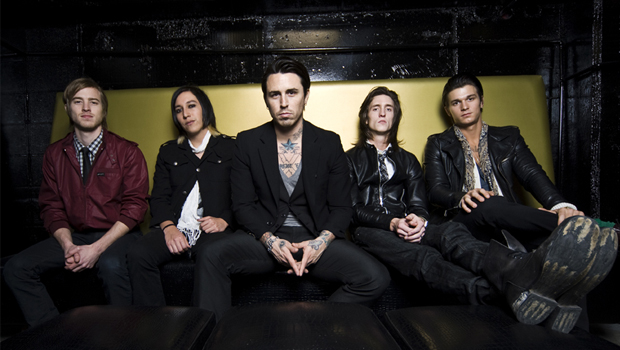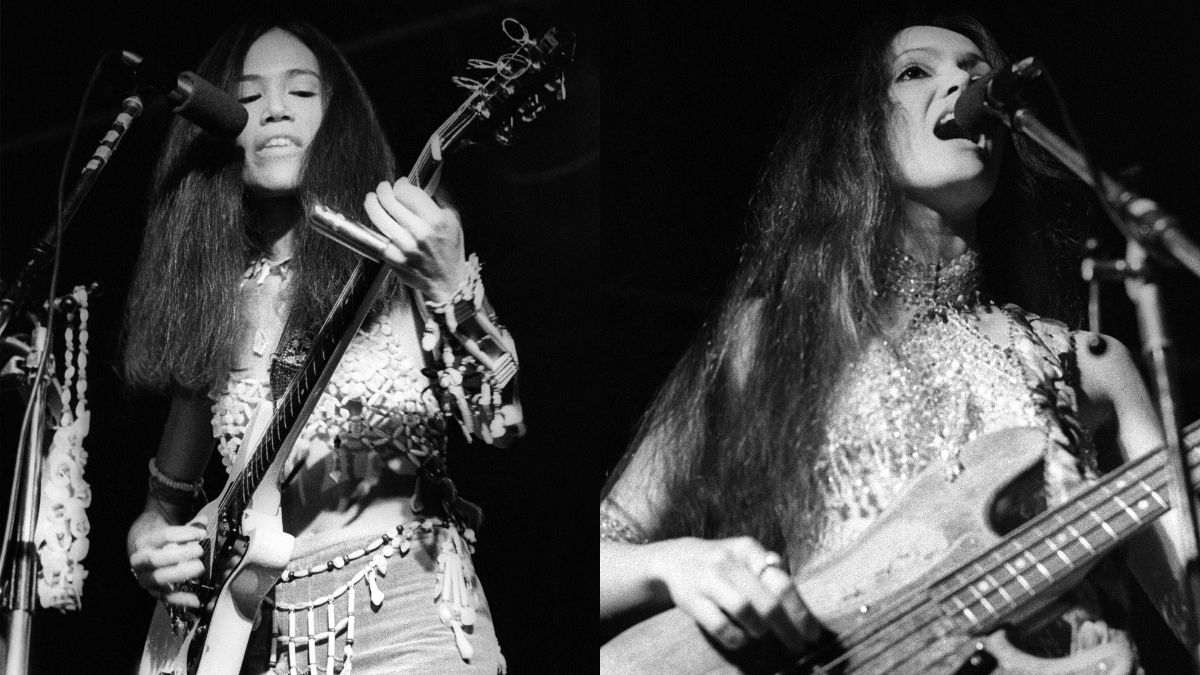All the latest guitar news, interviews, lessons, reviews, deals and more, direct to your inbox!
You are now subscribed
Your newsletter sign-up was successful

Burn Halo made a name for themselves quickly, in part due to the name power of lead singer James Hart, who began Burn Halo as a solo project after his previous band, Eighteen Visions, called it a day. It also didn't hurt that Avenged Sevenfold guitarist Synyster Gates lent a few lead tracks to the album.
By the time Burn Halo was done, it was clear to all involved that this was no mere solo project; this had to be a band.
On their sophomore effort, Up From The Ashes, the band turn up both the gain and the hooks to deliver a considerably more heavy -- yet just as catchy -- album than their first. Synyster Gates makes no appearances on this album, but given the chops of lead guitarist Joey Roxx, you likely won't be missing him.
GuitarWorld.com recently spoke with Burn Halo guitarist Joey Roxx about the new record, the harsh realities of life on the road, and the fun to be had with a good practice amp.
GUITAR WORLD: James [Hart, lead singer] wrote a lot of the first album before the band was fully formed. How did the songwriting process happen on the new album?
JOEY ROXX: On this new one, it was actually really easy. I live in California and so does James, so he and I just got together and wrote and just geeked out by ourselves while working on the songs. Then the other three guys in Oklahoma wrote on their own. We brought the finished products to the table, and everyone added their own flare to it. It was pretty seamless.
How do you and Brandon work out your guitar parts? Do you guys fall into traditional lead/rhythm roles?
All the latest guitar news, interviews, lessons, reviews, deals and more, direct to your inbox!
Yeah, it's pretty traditional. Brandon's not necessarily the most technical guy, but he has a great style and does a lot of cool things; me, I'm the shredder. So in that sense, we have a real traditional style but it works because no one's competing for leads.
On the song "Give Me A Sign" on the new record, Brandon actually played the intro solo because it was something really cool that he came up with, and it was like, "Cool, you came up with it, you should play it." We've never really fought over parts.
How do you think you guys have matured since the first record?
Honestly, man, we were on tour for a good two years, and everything that could go wrong went wrong, so just trying to overcome all that stuff.
To tell you the truth, when we started writing this record, it was more of a typical active-rock type record; then Brandon brought that song "Dakota" to the table, and James was like, "I like this, this is heavy!" Then all of a sudden a light when off in my head and I thought, "All these ideas I had that I thought were way too heavy, we can use now."
So then we really went off on our own and wrote the record you hear now, which is really what the band wanted to do.
What might fans of the first album be surprised by when they hear Up From The Ashes?
A lot of people -- because Synyster Gates played on our last record -- expect some good guitar playing on this record, and I have a feeling they won't be disappointed. They might even be surprised by some of the stuff we've done.
They can expect a heavy record full of riffs. I got a great heavy tone because I'm running the Bogner Uberschalls with Seymour Duncan Invaders.
It's just a great, old-school hard rock/heavy metal record.
What sort of guitars were you using on the record?
I'm good friends with Mike, the president at Schecter, and they've had our corner since day one. They were the first endorsement I ever got, and they helped the band through a lot of bullshit. On this record I used a couple of C1 Hellraisers, one with a Floyd Rose and one with a fixed bridge, both with Invaders. I really love high-output pickups. I like having that extra beef if I need it.
So on the first record, was Synyster in the studio with you guys on the first record, or did he track most of his parts on his own?
He did almost everything on his own, just came in and did his thing.
But, you know, he took us out on our first tour, because James grew up with the Avenged guys. It was really cool, some fan actually sent me a picture of me, [late Avenged Sevenfold drummer] The Rev and Gates. It was one of those moments that really hit it home for me.
Gates would show me some stuff here and there, and playing with that guy really makes you a better player; he's far better than anyone knows.
Have you picked up any really good pieces of advice from him that have stuck with you?
He's given me a lot of good advice. A lot of guitar players now are rediscovering a lot of cool shred techniques, especially sweep picking, and they just want to sweep all day long. He's the guy that can do all of that, but he doesn't necessarily do that all the time. He's about combining the shredability with really good note choice, which is what he stressed to me, how I had to pick my notes carefully to create more memorable solos that compliment the song and vocals.
So you mentioned earlier that you guys went through your share of troubles in your first few years, especially on the road. Can you give us a good story from life on the road?
We had our van broken into in Newark, New Jersey, and then another time some guy tried to punch out the windows of our van and beat up our merch guy over hitting on his girlfriend or something crazy like that.
One you can print that's probably the funniest was one time, me and Avenged's drum tech Matt, we had just gotten the Roland Cube practice amps. We were on tour with Papa Roach and Buckcherry and we would just follow people around and write their theme songs based on the way they walked [laughs]. That was a super-fun tour.
Up From The Ashes is out June 28.
Photo: Phill Mamula
Josh Hart is a former web producer and staff writer for Guitar World and Guitar Aficionado magazines (2010–2012). He has since pursued writing fiction under various pseudonyms while exploring the technical underpinnings of journalism, now serving as a senior software engineer for The Seattle Times.

